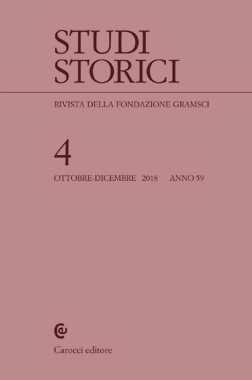
aprile - giugno 2014 anno 55
Sommario e abstract degli articoli
Didier Boisseuil, pp. 365-384
Le bain dans les sociétés occidentales à la fin du Moyen Âge
The bath in Western societies in the late Middle Ages
This brief article discusses Medieval bathing habits which were many and varied, contrary to what has long been believed, thanks particularly to the rising popularity of thermal springs. The development of new practices was linked to the creation of stufae and thermal basins, and found support, at least in Italy, from the medical profession, which encouraged their spread.
Roberto Finzi, pp. 385-401
Misteri e inerzia storiografica: il caso Cantillon
Mysteries and historiographical inertia: the case of Cantillon
Behind the appearance of original research, historiographical work often conceals inertia. One very clear example regards the «enigmas» surrounding an acknowledged classic of economic thought, Essai sur la nature du commerce en général by Richard Cantillon – an author whose life, wrote one of his most important biographers, is «un enigme. Sa naissance, sa carrière, sa mort, demeurent même entourées de mystère». A different perspective can lead to results far from well-established canons. This is what the author does, using sources for all notes, but for the most part read separately, following long-standing tradition. The result is the emergence of numerous fresh and new avenues of research. This is above all as regards the possible publisher of the Cantillon manuscript and the famous Supplément of calculations. For some, the Supplément – never found and perhaps never even existing in the first place – has placed the Essai’s author among the fathers of Econometrics.
Catherine Rancon, pp. 403-430
Angelo Tasca et la tradition du socialisme français
Angelo Tasca and the tradition of French socialism
From his early years to the 1940s, Angelo Tasca, who had quickly acquainted himself with French culture and would later even become a French citizen, dedicated much thought to French socialism, which he always considered of great importance. His approach to this question, however, changed significantly during the period, reflecting the evolution in Tasca’s thinking, especially about Marxism, in the 1930’s. Having started with the idea that the study of the French socialist tradition could enlighten the genesis of Marxism and was thus interesting mainly as a forerunner to this more developed approach of socialism, Tasca soon began to take an interest in French socialist thought for its own sake, discovering its richness and consistency. He found in Fourier, Blanqui or Jaurès kinships with his own ideas and an answer to some facets of Marxism that he progressively rejected: he drew an opposition between its idealism and Marxist determinism, saw in it an alternative to state socialism, and preferred itsquest for universalism over the exaltation of class war. It gradually supplanted Marxism as an inspiration for a renewed contemporary socialism.
Il presente come Storia
Francesco Barbagallo, pp. 431-434
Enrico Berlinguer. Il Pci come partito della democrazia socialista
Enrico Berlinguer. Pci as the party of Socialist Democracy
The text revisits a speech made in the Italian Chamber of Deputies, marking the first circumstances, in 1974 and in 1976, when Enrico Berlinguer defined the moral question as the main political question to be resolved at once in order to put an end to Italy’s crisis and decline. The essay then reconstructs the politics of independence from the Ussr, which increased from 1968 to 1981-82, and the evolution of the model of Italian Communism, which Berlinguer identified with a party of Socialist Democracy.
David Bidussa, pp. 435-447
La politica della storia: il Giorno della memoria
History and politics: Holocaust Memorial Day
This article aims to discuss the origins, the meaning and the educational uses of Holocaust Memorial Day and the function of memorial politics in social and political consciousness in Europe, and above all in Italy. Holocaust Memorial Day is connected with how the lessons of the past can inform our lives today and ensure that everyone works together to create a safer, better future. Visits dealing with the Holocaust – to memorial sites and museums, or to Nazi concentration camps (Auschwitz-Birkenau) – can provide students with a concrete picture of the possible consequences of failing to respect human rights. On the other hand, the growth after 1989 of such activities as memorial trips and Memory Trains, are similar to different forms of political pilgrimages in the twentieth century (above all, political journeys to different places of political utopias, etc.): during the twentieth century, the political travel experience was devoted to meeting and learning about different forms of a possible future, while the memory train is devoted to learning how to avoid repeating a terrible past.
Claudio Natoli, pp. 449-480
La sinistra del Pci negli anni Sessanta
The Pci’s left in the 1960s
This essay analyses the birth and development of the left in the Pci from 1956 until the 1960s. It focuses on the variety and complexity of individuals and contributions within this political current: the innovative wing of the Cgil, the return to onsite factory negotiations, the critical reflection on the centre-left experience, the original research on structural reforms and the new economic growth model, the overcoming of the party’s centralized and hierarchical structure, and the way out of collateralism with the Ussr. The Eleventh Congress of the Pci (1966) was to lead to both the apogee and the Diaspora of the Communist Left. The failed renewal of communist politics and the reaffirmed old tradition of the Pci were to be serious obstacles to the Italian communists’ activity in the crisis and «great transformation» between the 1960s and 1970s.
Nicola Tranfaglia, pp. 481-494
Aldo Moro e le culture politiche della Repubblica
Aldo Moro and the Italian Republic’s political cultures
As a political man, Moro was to personify better than others the cleverness of dialogue and cooperation among the fundamental political cultures of Italian democracy. There were two limitations on democratic participation in Italy: resistance to the antifascist revolution, and the fact that democratic culture failed to penetrate our country. Moreover, a bitter Cold War characterized the relationship between the two main political ranks. Central were Aldo Moro’s role in the Constituent Assembly, the three governments that he led, his opposition in the Catholic Party after 1968, the crisis of the 1970s, and the political choices of the Dc and Pci. Moro, as his friends were to say, the moment he was abducted, was already sentenced to death.
Fiamma Lussana, pp. 495-519
Famiglia e indissolubilità del matrimonio nel dibattito all’Assemblea Costituente
The debate on family and indissolubility of marriage at the Constituent Assembly
This essay reconstructs, in the social and political context of postwar Italy, the debate on the family that took place at the Constituent Assembly from October 1946 until April 1947 among all the parties represented in the first republican legislative body. The article analyzes in particular the troubled discussion on the indissolubility of marriage after the voting on article 7, approved also with the aid of communist votes, which recognized the Concordat between Church and State, and in particular the civil effects of religious marriage. The groundwork for the long, hard, parliamentary battle over divorce began with the tortured exclusion of the adjective «indissoluble» modifying the word «marriage».
Alessandro Santagata, pp. 521-543
Una nuova «visione strategica». Il Partito comunista e la ricezione politica del Concilio Vaticano II (1958-1968)
A new «strategic vision». The Communist Party and the political reception of the Second Vatican Council (1958-1968)
The paper deals with the reactions of the Italian Communist Party to the celebration and the initial reception of the Second Vatican Council. Based upon examination of the Communist press and the documentation of the Communist leadership, it investigates how the Vatican II resolutions modified the Party’s electoral and political strategies. Particularly, the research focuses on the political debate concerning the crisis of the Christian Democracy Party after Vatican II and the Communist plan to take advantage of the Catholic protest against the alliance between the Church and political power. In the Communist view, the most important result of Vatican II was the «End of the Constantinian Era». The operation’s failure to involve some leaders of the Catholic «dissent» in the electoral rolls for the Senate was to represent one of the proofs of the Communists’ difficulty in understanding the depth of this transformation and in reacting to the Catholic crisis of 1968.
Potito d’Arcangelo, pp. 545-570
Storia, storie e diritti della pastorizia mediterranea dal Medioevo all’età contemporanea
History, stories and Mediterranean grazing rights from the Middle Ages to the contemporary age
Given the great number of different situations and solutions that emerged down through the centuries, the attempt to interpret, sub specie pastorali, the Mediterranean’s last millennium, is an ambitious enterprise. This critical note offers an articulated reading based on the papers gathered in La pastorizia mediterranea. Storia e diritto (secoli XI-XX), edited by Antonello Mattone and Pinuccia F. Simbula (Roma, Carocci, 2011), dedicated mostly to the Italian and Iberian peninsulas. The focus is on six themes: the pastoral life and the clash between shepherds and peasants; the organization of pastoral spaces as a need of local communities; the rise of the modern State and its effects on pastoral activities; institutionalized transhumances: the case of the Dogana della mena delle pecore in Foggia; signs on the land and economic growth; Sardinia, kingdom of sheep.
Sfoglia gli altri numeri dell’anno 55 / 2014
Elenco dei fascicoli pubblicati dal 2010
Seleziona fascicolo...
- anno 65 / 2024
- 1
- 2
- anno 64 / 2023
- 1
- 2
- 3
- 4
- anno 63 / 2022
- 1
- 2
- 3
- 4
- anno 62 / 2021
- 1
- 2
- 3
- 4
- anno 61 / 2020
- 1
- 2
- 3
- 4
- anno 60 / 2019
- 1
- 2
- 3
- 4
- anno 59 / 2018
- 1
- 2
- 3
- 4
- anno 58 / 2017
- 1
- 2
- 3
- 4
- anno 57 / 2016
- 1
- 2
- 3
- 4
- anno 56 / 2015
- 1
- 2
- 3
- 4
- anno 55 / 2014
- 1
- 2
- 3
- 4
- anno 54 / 2013
- 1
- 2
- 3
- 4
- anno 53 / 2012
- 1
- 2
- 3
- 4
- anno 52 / 2011
- 1
- 2
- 3
- 4
- anno 51 / 2010
- 1
- 2
- 3
- 4
